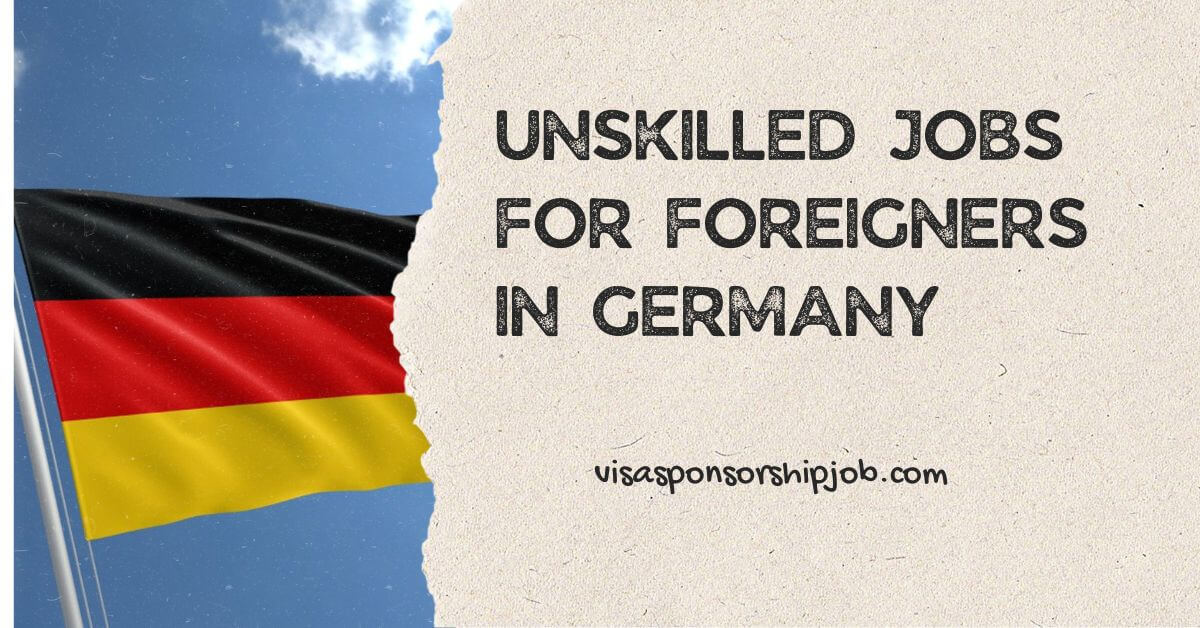Some people wish to start a new life in Germany but lack the necessary skills. If you are one of these people, we have good news for you. For foreigners seeking a better life, there are unskilled occupations available in Germany. Except otherwise specified by the employer, these vocations do not require any skill, good, or special education to begin.
Germany is a successful country that attracts an increasing number of foreign employees each year. According to the Federal Employment Agency (BA), there will be approximately 10 million foreign workers in Germany. The necessity for unskilled labor is driving this flood of workers. Unskilled labor is critical to the German economy because it allows businesses to perform manual jobs that require little to no training.
Requirements for working in Germany:
You must meet certain requirements in order to work in Germany. To begin, you must have a valid visa. You can apply for a German work visa through the German embassy or consulate in your home country. Second, you must be fluent in at least one foreign language. The primary language used in the workplace for the majority of unskilled jobs in Germany is German. Finally, foreign workers must obtain health insurance and pay taxes and social security.
Check Also: Supermarket Jobs in Germany
Top Unskilled Jobs for Foreigners in Germany:
For foreigners, there are various unskilled career prospects in Germany. Some of the most prevalent careers that do not require sophisticated skills or education are as follows:
- Cleaners and janitors
- Kitchen helpers and dishwashers
- Supermarket cashiers and stock clerks
- Housekeepers
- Factory workers in manufacturing and assembly lines
- Warehouse workers and packers
- Construction workers and laborers
- Landscapers and gardeners
- Caregivers for elderly and disabled patients
- Delivery drivers
- Retail salesperson
- Nanny
These jobs do not necessitate advanced training or education. Some of these, however, may require special qualifications or credentials, such as a driver’s license or a forklift license.
1. Cleaners and janitors
Cleaning offices, public venues, and residential locations is part of the job. This role requires no specific professional qualifications.
2. Kitchen helpers and dishwashers
This position includes dishwashing and aiding cooks in the kitchen.
3. Supermarket cashiers and stock clerks
Working as a cashier or refilling grocery shelves is part of this employment.
4. Housekeepers
This work includes keeping homes clean and orderly.
5. Factory workers
Factory employees in production and assembly lines: These individuals assist in the assembly of various factory products.
Requirements: No formal qualifications are required, but some organizations may require prior experience in a similar capacity.
Duties: Handling machinery, assembly line operations, and packaging are all part of the job.
6. Warehouse workers and packers
Workers prepare products for shipment and delivery by picking and packing them.
7. Construction workers and laborers
On construction sites, workers assist with a variety of jobs.
8. Landscapers and gardeners
Caregivers for the elderly and disabled
9. Caregivers for elderly and disabled patients
This position entails supporting elderly or disabled patients with daily routines.
10. Delivery drivers
Packages are delivered to businesses and individuals by workers.
11. Retail salesperson
Requirements: Minimum qualifications, such as a secondary education, are necessary. Retail expertise is advantageous.
Duties: Customers are served, tills are operated, and shelves are restocked.
12. Nanny
Requirements: An excellent command of the German language, experience caring for children, and certification in first aid and emergency training are all desirable.
Duties: Duties include caring for children, educating them, and managing home activities.
Visa requirements for unskilled workers in Germany:
You must apply for a visa to enter Germany in order to work lawfully as an unskilled worker. The visa application process differs depending on your age, work offer, and home nation.
The German government provides an unskilled worker visa to persons under the age of 25 who are looking for work that does not require significant skills or education. You must have a job offer from a German employer and be able to support yourself throughout your stay in Germany to apply for this visa. This visa is valid for a period of up to twelve months.
How to apply for unskilled jobs in Germany:
Online job portals are the greatest approach to applying for unskilled employment in Germany. There are numerous job portals accessible, such as Indeed and Monster, that can assist job searchers in finding employment that they are qualified for. Other methods, such as job agencies, may assist you in finding and applying for unskilled jobs in Germany.
We have produced a detailed post on the 7 Top Recruitment Agencies in Germany for English Speakers to help you connect with a reliable recruitment agency in Germany.
Website for unskilled jobs in Germany:
There are various websites in Germany that advertise unskilled jobs. Here are some of the most well-known websites:
1. Indeed:
This website is an excellent resource for job searchers looking for work in many industry sectors.
2. Monster:
This website allows job seekers to search for jobs by industry, occupation, and location.
3. Work In Berlin:
This website is designed exclusively for job seekers interested in working in Berlin.
4. Stepstone:
This website is another job platform that provides job seekers with a diverse choice of career opportunities.
Benefits of Unskilled Jobs for Foreigners in Germany:
- Employment Opportunities: Germany’s economy is strong, and there is a high demand for workers in a variety of industries, including construction, hospitality, agriculture, and manufacturing. Unskilled labor positions, such as farm laborers, cleaners, dishwashers, or construction workers, may be available to foreigners.
- Wages: Germany is known for offering fair wages, even for unskilled labor. The minimum wage is set by legislation and is generally greater than in many other nations, allowing workers to earn more money.
- Social Benefits: Workers in Germany are entitled to various social benefits, such as health insurance, unemployment benefits, and retirement benefits, regardless of their skill level. These benefits might act as a safety net for foreign workers in the event of an emergency.
- Strong Labor Laws: Germany has strict labor laws that safeguard the rights of all workers, including foreigners. Working hours, overtime pay, paid leave, and workplace safety are all covered by these rules. Labor exploitation is largely not condoned.
- Access to Education and Training: While unskilled professions normally do not necessitate extensive education, Germany provides workers with the opportunity to upgrade their skills and certifications through vocational training programs. In the long run, this can lead to improved job opportunities.
- Quality of Life: Germany is well-known for its high level of life, high-quality healthcare, and good public services. Even in unskilled jobs, foreign employees can benefit from these elements of German society.
- Path to Permanent Residency: While it may be difficult for non-EU citizens to obtain unskilled work visas at first, Germany has avenues for long-term residents to obtain permanent residency and, eventually, citizenship. This can give foreign workers additional stability and possibilities.
- Cultural Experience: Working in Germany allows you to immerse yourself in a new culture, acquire a new language, and experience life in Europe.
Importance of Unskilled Work for the German Economy:
- The German economy relies heavily on unskilled labor. The economy would not function as efficiently without these jobs. Unskilled workers are an important portion of the labor force since they contribute to the smooth operation of numerous sectors.
- Furthermore, the building industry is another area that requires unskilled labor. Unskilled laborers are also essential in the healthcare and grocery industries.
- Finally, without the contributions of unskilled employees, Germany’s economy would suffer. These jobs are critical for a healthy economy and low unemployment rates.
What are the challenges and opportunities for Foreign workers in Germany?
Language hurdles and cultural differences in the workplace are frequently the most difficult challenges for international workers in Germany. However, there are prospects for promotion, and many organizations provide training programs to help their employees improve their skills. German labor rules also ensure that all employees work in a safe atmosphere.
Conclusion:
Foreigners seeking work in Germany can benefit greatly from unskilled jobs in Germany. These options include employment security, good income, promotion opportunities, and a work-life balance. The German economy needs unskilled employees, and there are several job options. Anyone can find a good unskilled job in Germany with a visa and a little study.
For More Info:
Email Your CV, and We’ll Find the Best Pathway For you: info@visasponsorshipjob.com
Frequently Asked Questions:
How to apply for unskilled jobs in Germany?
Job boards on the internet are the most effective way to apply for unskilled employment in Germany. There are many job portals accessible, such as Indeed and Monster, that can help job searchers in finding employment that they have the skills for. Other approaches, such as job agencies, may assist you in locating and submitting applications for unskilled jobs in Germany.
Can I work in Germany without qualifications?
In order to get a job in Germany, you have to prove that you are more able or would perform better than the German applicant or another European candidate who is authorized to work in the country. That’s a big hill to climb. So, even if you don’t have a level, you’ll need experience and other qualifications to succeed.
Can unskilled workers get a work permit in Germany?
An unskilled job does not qualify for an employment visa or a Blue Card. For example, you can’t get a work visa to work as a cashier or at a contact center. If you are interested in applying for a Blue Card, your yearly earnings must be at least 58,400€ (before taxes).






